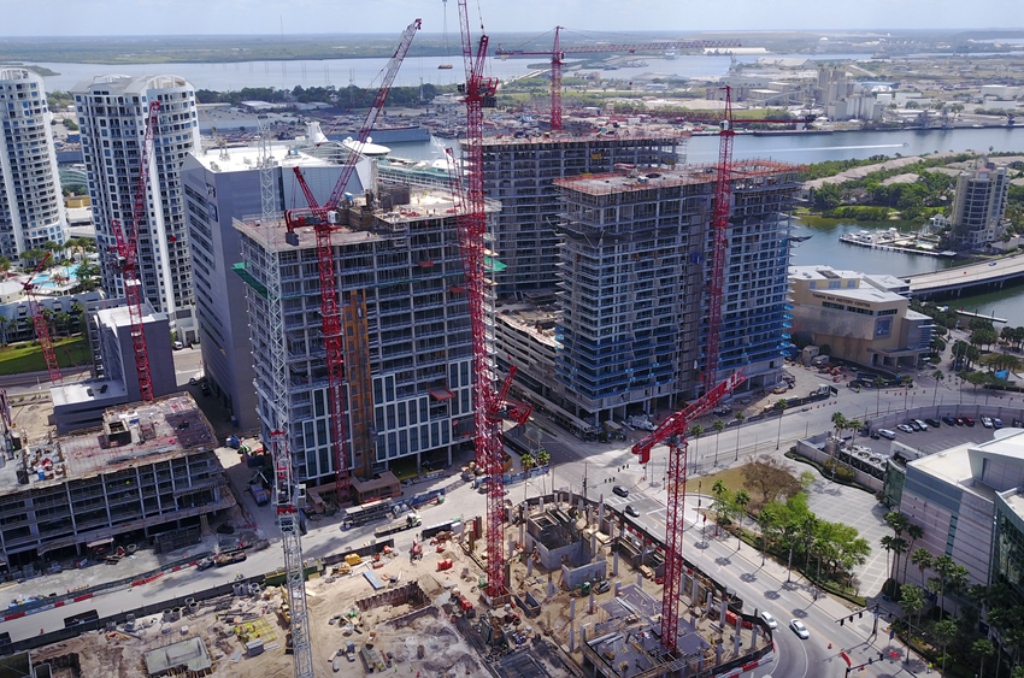Construction cranes on large buildings being erected in downtown Tampa Channelside district, seen in aerial panoramic views, March 20, 2020. Photo and Caption: TetKabrit/Shutterstock.com
As the state economy tries to bounce back from closures due to the coronavirus pandemic, many Floridians are worried about how the housing market will be affected in 2020 going into 2021. A new tax bill could have a negative effect for people facing a cash crisis due to being laid off because of COVID-19. With historic unemployment numbers currently affecting people all over the country, how much property values and how much property taxes people will have to pay for their homes remains a mystery.
With that uncertainty comes trepidation. Homeowners are expecting the worst when it comes to how much their house will be worth come next year in 2021. Luckily, the coronavirus pandemic has brought with it some relief for renters and homeowners. Property appraisers say state law requires them to only judge the values from 2019, so a fallout from the coronavirus can’t be considered.
Florida real estate taxes make up 1.1% of the assessed value of the house. This is slightly below the national average of 1.111%. Florida property and sales tax support most state and local government funds since the state does not charge personal income tax. This allows breathing room for homeowners and commercial property owners to make their budgets to pay for everything from police salaries, park maintenance and street repairs.
Florida’s economy relies heavily on seasonal residents and tourism. In addition to sales tax revenue, Florida citizens benefit from exempting the estate from property taxes. This means that seasonal residents, as well as those who own rental and commercial real estate, pay a higher property tax rate than primary residence owners.
Walton County has the lowest property taxes in Florida, 0.79%, then Jackson County 0.73% and Santa Rosa County 0.77%. Bay and Monroe were connected with the fourth least expensive district at a rate of 0.79%. The three counties with the least expensive property tax rates are Walton, Santa Rosa, and Bay. They are in the northwestern part of the state, otherwise known as panhandle.
Fort Walton Beach in Walton County, Pensacola in Santa Rosa and Panama City in the Bay Area are the best in terms of tax rates and still have the advantage of being in the Gulf of Mexico. Jackson County is also part of the creek, but is located within the country and shares the border with Georgia.
But when many people think about moving to Florida, it is South Florida, mainly Miami or Miami Beach. Key West and the rest of the Florida Keys may also be a desired relocation site. The Miami-Dade area property tax is 1.06%. Its neighbor in the north of Broward County, which includes Fort Lauderdale, is 1.22%.
In Broward County, values increased an average of 6.1%, with some of it attributed to new construction; the top three valued projects came from Fort Lauderdale. The city of West Park had the biggest jump in Broward County at 10.2%. In Miami-Dade County, the average increase is 4.6%; the city of West Miami had the biggest jump for that county at 12%. Palm Beach County taxable property values have increased by 5.51% from 2019 to 2020. The newer city of Westlake, which has new home construction, had a triple-digit jump in values.
New homes built after COVID-19 have more value than they did previously, according to property county appraisers. Mike Pappas, the president and CEO of the Keyes Company, one of the country’s largest real estate companies, said property values are affected when there’s an oversupply of properties on the market with less demand for them. “It’s a supply-and-demand issue,” he said.
Experts say there could be a foreclosure wave next year as companies go out of business “and those jobs don’t come back,” said Chad Van Horn, a Fort Lauderdale-based bankruptcy attorney. That could mean people can’t pay their mortgage to keep their homes. Van Horn said while he doesn’t expect the glut of foreclosures and short sale homes on the market like in the 2008 crash, he expects trouble as people have to deal with multiple financial problems at once, including other debt. “I think property values are going to take a hit,” he said.
Chris began his writing as a hobby while attending Florida Southern College in Lakeland, Florida. Today he and his wife live in the Orlando area with their three children and dog.

